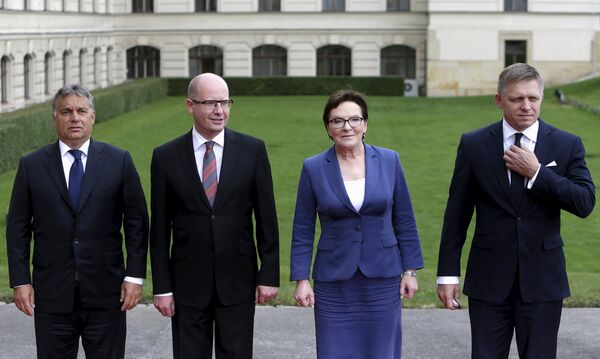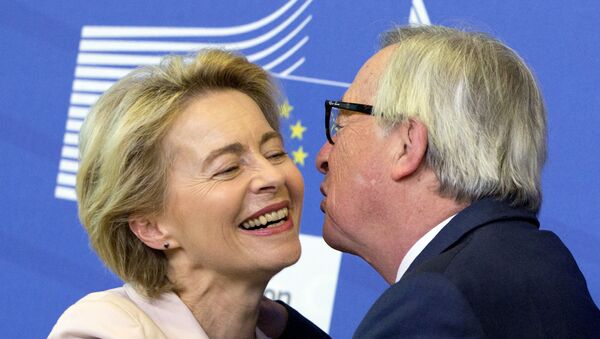Luc Rivet - Earlier on Wednesday, the European Parliament approved von der Leyen's commission in a 467-157 vote, with 89 abstentions. The new commission is set to take over on 1 December.
In a bid to build a consensus in the hemicycle and outstretch her hand to the Visegrad group countries of Central Europe, very much opposed to the present EU leadership, von der Leyen started her keynote speech in the parliament by referring to the anti-Communist Czech Velvet Revolution of 1989 and quoting late President Vaclav Havel.
"Europe is not only about partisan politics, rules or regulations, markets or currencies. It is ultimately, above all else, about people and their aspirations, about people standing together for their liberty, their values, simply for a better future … Our Union in the next 5 years, will embark on a transformation that will change each part of our society, of our economy, and we will do it because it is the right thing to do, not because it will be easy. We make our best achievements when we are bold", she said.
New Commission Gave Her Headaches to Assemble
It was tough to organise her commission. First, UK Prime Minister Boris Johnson bluntly told the EU that Britain would not send a commissioner, since he aims to take the country out of the union very soon, probably on 31 January. It could even be earlier if Johnson and his Conservatives win the December general election.
The European Commission complained that 60 million Brits would not be represented in Europe in this case, but the UK government remained steadfast.
A sensible, fully costed manifesto from the Conservatives.
— Leave.EU (@LeaveEUOfficial) November 24, 2019
Let's deliver Brexit, end the dither and delay and defeat the threat of Corbyn!
In addition, the parliament rejected nominees for commissioners from France, Hungary, and Romania.
The French nominee defeat was a real slap in the face for President Emmanuel Macron as his personally-chosen candidate, Sylvie Goulart, was voted down for lobbying for an American think tank in the past and a poor performance during the hearing.
The Romanian candidate for transport commissioner, Adina-Ioana Valean, had to revise her financial declarations before being accepted. And last but not the least, the Left members of parliament did all they could to reject the Hungarian candidate, because of the guerrilla that the Socialists and Greens wage against President Viktor Orban's government in Budapest.
Hungarian candidate Laszlo Trocsanyi, a former justice minister, had to give way to another candidate, Oliver Varhelyi, the country's incumbent ambassador to the EU. Varhelyi is slated to take up the enlargement portfolio, a position coveted by Orban, to impact European policies, notably in the Balkans.

The French replacement candidate was Thierry Breton, a former CEO of French IT company Atos. He was grilled by the Left, who were wondering if Breton could be "above the fray" and would not favor his former company.
In the end, lawmakers voted 12-11 to give Breton the all-clear. Breton pledged to stay away from decisions directly involving Atos and to avoid conflicts of interest.
But Breton still had a rough ride. The Progressive Alliance of Socialists and Democrats (S&D), the Greens and the European United Left–Nordic Green Left (GUE /NGL) unsuccessfully requested that he answer additional written questions.
Finally, von der Leyen herself is not the all-accepted leader of the European Commission. In addition, she is under surveillance by her two executive vice-presidents, Dutch Socialist Frans Timmermans and Danish Margrethe Vestager, who both competed for the commission's top post.
Von Der Leyen's Team
The two executive vice-presidents are the "godfathers" of von der Leyen since their portfolio and experience make them look more powerful.
Timmermans (S&D) is in charge of the arguably most important portfolio – the European "green deal" on the fight against climate change, which was presented by von der Leyen as the commission's first priority. He will also likely continue influencing European institutions' war against the "populists" and countries like Poland and Hungary.
Today, I presented my agenda for #Europe to the #EUCO:
— Ursula von der Leyen (@vonderleyen) October 18, 2019
➡️More research and innovation
➡️Climate protection
➡️A boost for digitisation
➡️A fresh start on migration
➡️A social and competitive Europe
➡️A stronger Europe in the world pic.twitter.com/etxbfvaQTv
Vestager (Renew Europe group) will direct and enforce European digital policy, which is the second priority of the new European Commission president. She might overshadow von der Leyen, since it is she who will be negotiating trade deals with China and the US and tax issues with tech giants. She will also have to make proposals on artificial intelligence, the 5G networks or fight against cybercrimes
Von der Leyen expects a roadmap from her two vice-presidents in the first 100 days of the new European Commission.
Breton is set to have a very broad portfolio spanning industry, digital, defense and space. He will, therefore, be another heavyweight in the new commission, with associations representing European enterprises, such as BusinessEurope hoping that his experience of manager will improve the bloc's economic policies.
Acting Spanish Foreign Minister Josep Borrell will replace Federica Mogherini as EU foreign policy chief. His intention is to promote Europe's expansion and reforms in the Western Balkans, support democracy and the integrity of Ukraine, address the challenges in the southern neighborhood, develop a new strategy toward Africa, work on political relations with Asia, step up cooperation with Latin America, reinstate transatlantic relations and be tough on Russia until the latter "changes its attitude on Crimea and territorial violations".
The European Union has to be the guardian of #multilateralism. We are stronger by doing together what we cannot do alone. pic.twitter.com/5JnntSQ18i
— Ursula von der Leyen (@vonderleyen) September 10, 2019
Belgian Foreign Minister Didier Reynders will become commissioner for justice and the rule of law. He is also a seasoned politician, known for his diplomatic language and avoidance of clashes. He looks like the exact opposite of Timmermans, who had aggressively attacked Poland, Hungary, and Italy under Matteo Salvini. Reynders will likely be much more diplomatic and his goal will be to appease rather than set fire to the Central European governments, who oppose the policies of Brussels in many aspects.
Ursula's Main Challenges
To secure the support of the European Parliament and Europeans on the whole, Angela Merkel's former defense minister faces at least three challenges.
First of all, she will need to impose her authority after having accepted a compromise that gives her two vice-presidents a considerable range of competences. Secondly, she will have to contribute to improving or at least maintaining intact the Franco-German axis that is re-imposed at the head of the commission but which has floundered on many issues.
Thirdly, von der Leyen will have the task of bridging the widening gap between the West and East of Europe: the May European elections showed a divide in values and identity issues that continues to weigh on the cohesion of the 27 member states.
In addition, von der Leyen is to get rid of her reputation as Germany's inefficient defense minister, something that actively promoted by her opponents.
DANKE! #cdupt19 pic.twitter.com/CB4Jtwqktr
— Ursula von der Leyen (@vonderleyen) November 22, 2019
'Men And Women Change But Policies Continue'?
Low hopes for von der Leyen on the part of a considerable group of lawmakers – especially from the right-wing parties – are another potential problem.
"We don't expect anything from this Commission. They intend to deepen the policies started by the [Jean-Claude] Juncker Commission, which are for the most part going in the wrong direction", Joerg Meuthen, a co-president of the Alternative for Germany (AfD) party and a European Parliament member, said.
According to the AfD leader, nothing has changed since "we refused our consent to Mrs von der Leyen when she came to parliament and was elected with a mediocre score."

"Today's appearance by Mrs Von der Leyen has strengthened our conviction that she is unfit as President of the Commission. The creation of a climate bank, CO2 import tax, strident gender equality demands and of course even more EU, so less real Europe are on her agenda. Her lack of principles and her verbal acrobatics to satisfy everybody, the conservatives as well as the progressives make her into a sort of Dr Jekyll and Mr Hyde. As I said earlier, her left-leaning performance is unacceptable to us", Meuthen argued.
Thierry Mariani, a European Parliament member from France's right-wing National Rally party, similarly has low expectations about the incoming European Commission president.
"Men and women change but policies continue. Von der Leyen will lead the same policy favourable to the absence of immigration control at the borders of Europe, the same policy of globalisation and free trade that destroys the industrial fabric of Europe, and worse, the same harmful foreign policies. We don't expect anything from this Commission that will not protect the European citizens", said.
A member of the European Parliament's Foreign Affairs Committee, Mariani, also expressed concerns over Borrell's stance on Russia, sanctions and the borders of Europe, saying that the latter told him at the hearing that "these borders are scars of a detestable period of History" and spoke for maintaining sanctions against Moscow "at all costs".



